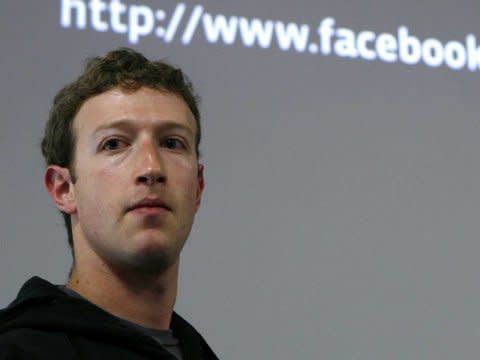Rocket Fuel IPO Offers Glimpse Of Actual Dollars Being Spent In Facebook's Ad Exchange
Reuters
Facebook CEO Mark Zuckerberg
Rocket Fuel, the real-time bidding adtech company, updated its IPO filing yesterday to indicate how much it expects to raise when its stock becomes available to the public: $981 million.
The company, which makes automated or "programmatic" ad buys for advertisers in online ad exchanges, is one of only 20 companies allowed to buy ads inside FBX, Facebook's ad exchange.
Until recently, observers had expected FBX to become a huge business for Facebook. The exchange allows advertisers to target Facebook users if they enter Facebook carrying a tracking cookie from another site. So if someone was shopping for shoes online, they might suddenly start to see shoe ads inside Facebook. Initially, analysts and adtech executives said they believed Facebook would capture a share of the real-time bidding (RTB) market that would be in the billions of dollars. But Facebook COO Sheryl Sandberg recently poured cold water on that, and said on the company's Q2 2013 earnings call that "One thing worth noting is that FBX which is part of that programmatic selling is actually a very small part of our business and I think sometimes people don't understand that. So that piece is quite small."
The Rocket Fuel IPO indicates just how "small" that business might be.
The company warns new investors in its stock that "Currently, our social media offering is entirely dependent on access to Facebook's inventory through FBX." It also says that Rocket Fuel gained access to FBX in Q4 2012. Rocket Fuel places clients like Brooks Running Co. and Sky TV in Facebook, via the exchange.
At the same time, Rocket Fuel experienced a big jump in its revenues and its cost of revenues — which are mostly pass-through media costs — also in Q4 2012. Here's what that looks like in a chart:
SEC / Business Insider
Just for fun, let's make some speculative assumptions about that revenue jump, and say that it was linked to Rocket Fuel's access to FBX and the influx of client interest in Facebook's new retargeting opportunity.
Prior to Q4 2012, the average sequential increase in Rocket Fuel's cost of revenues was about 22%. In Q4 2012, however, the sequential increase was 54%. So let's assume, for the sake of argument, that the difference between the two jumps is about 32 percentage points, or 58% of the increase.
In other words, we're assuming that 58% of the sudden increase in Rocket Fuel's revenue costs were due to its extra spending (and extra gross revenue) in FBX.
Here's what that means in real dollars, when you isolate 58% of the increase in revenue costs from Q4 2012 through Q2 2013:
ROCKET FUEL'S SPEND INSIDE FBX
Q4 2012: $8.2 million
Q1 2013: $6.2 million
Q2 2013: $9.5 million
Those are the sums that, in our speculative assumption, Rocket Fuel spends buying ads inside FBX.
There are only 20 demand-side platforms (DSPs) buying ads in FBX. So if you were to make a further — albeit increasingly speculative — assumption that Rocket Fuel is a buyer of average size in FBX, then we can say that maybe Facebook gets about $200 million per quarter from FBX, or maybe $800 million a year.
Facebook's revenue in Q2 2013 was $1.8 billion, so FBX would be ~11% of that.
So, $800 million isn't the $1 billion observers thought it might be, but it's certainly well on the way.
We've reached out to Facebook and Rocket Fuel for comment and will update this post if either responds.
Disclosure: The author owns Facebook stock.
More From Business Insider



